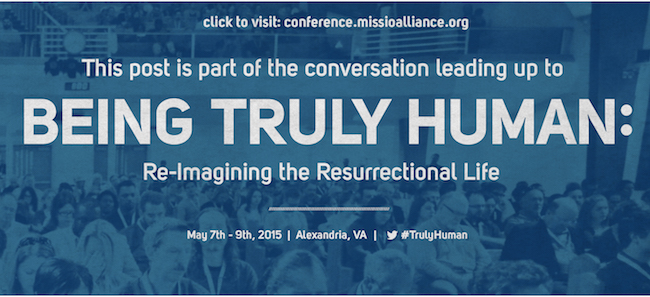Don’t become so well-adjusted to your culture that you fit into it without even thinking. Instead, fix your attention on God. You’ll be changed from the inside out. Readily recognize what he wants from you, and quickly respond to it. Unlike the culture around you, always dragging you down to its level of immaturity, God brings the best out of you, develops well-formed maturity in you. – Romans 12:2 MSG
The culture of the Kingdom of God has no other language and no other custom other than that of the particular people and society who become its manifestation. Yet these existing social and cultural forms are relativized to the real humanity of Jesus Christ as expressed through the embodiment of the Gospel in the lives of Christians.[1]
The culture of the Kingdom, of God’s story of true humanity embodied in Word and Spirit, the Christ and His church, is discovered as one lives with and amongst one’s neighbours, the culture. Schreiter explains that “it takes the dynamic interaction of all three of these roots- gospel, church and culture- with all they entail about identity and change, to have the makings of a local theology”[2] and Grenz and Franke agree describing “an interactive process that is both correlative and contextual”[3] such that “both gospel (that is our understanding of the gospel) and culture (that is, our portrayal of the meaning structure, shared sense of personal identity and socially constructed world in which we see ourselves living and ministering) are dynamic realities that inform and are informed by the conversation itself.”[4]
Furthermore, as one participates in this ‘conversation’, one also acknowledges one’s own presuppositions and perspectives since “all human self-perception is culturally conditioned because all self-perceptions are socially determined.”[5] Through this process, we learn not only to “express the gospel through the ‘language’ of the culture- through the cognitive tools, concepts, images, symbols and thought forms – by means of which people today discover meaning, construct the world they inhabit and form personal identity”[6] but to embody it, Christopraxis in the places/neighbourhoods God has sent us. As Anderson explains, “every culture is related to the critical construct of real humanity through the power of the Gospel. And to that extent every culture can bear in its own social structures the reality of the kingdom of God and make manifest the humanity of the Kingdom through its own forms.”[7]
How then do we Interpret our Culture in the Reality of the Kingdom Culture?
With this understanding of culture and its impact and relationship with the Word and Spirit both in it and beyond it, that is the reality of the Kingdom of God in our midst, we want to listen to our neighbours, our neighbourhood in order to recognize culture’s “principal values, needs, interests, directions and symbols”[8] while affirming that “the risen Christ’s salvific activity in bringing about the kingdom of God is already going on”[9] in our context/community. Alan Roxburgh from his exegesis of Luke 10 makes a strong argument for the construction of local theologies…
…through engagement with the concrete ordinariness of the local. We know God in the concreteness of particular stories that have occurred in specific times and places….in the social constructions of our lives, through the social imaginaries of our time and place and through the concrete encounters we have with the people and communities about us.[10]
He proposes that we make a practice of living with and sitting among the people in the towns and villages to which [we have] been sent…to be present with and attend to their stories.”[11] This seems to be a practical way of affirming Grenz and Franke’s observation that “the culture specific nature of divine truth arises directly out of the doctrine of the incarnation with its reminder that the word became flesh in a specific cultural context (John 1:14). As the incarnate one, Jesus ministered to culturally embedded people in first century Palestine in a culturally sensitive manner.”[12] It also roots us in the Kingdom culture perspective articulated by Anderson which, said another way, insists that “Christians are not called to be a group that exists over against the rest of humankind. In fact, they are not called to be anything but truly human…Christians are co-participants with people around them in an ongoing conversation about what it means to be human…with a unique vantage point…viewing all things in connection to the God of the Bible who they believe is revealed supremely in Jesus Christ.”[13]
As we live among, listening to our neighbours, discerning the Spirit at work in and through them and us, identifying cultural disconnects as well as ways in which they are participating in God’s Story (perhaps without even knowing it), we come to understand ourselves, our culture and what God is up to, such that we can, and we can invite our neighbours to, more fully engage in and embody the Word and Spirit in the Story moving towards fullness of life, our true humanity and shalom in God’s Kingdom.
In this way, may we as His sent ones, be found in the Trinity that “the world may believe” that Jesus is the way, the truth and the life (John 17:23, 14:6).
—
[1] Anderson, The Shape of Practical Theology: Empowering Ministry with Theological Praxis. Downers Grove, IL: IVP, 2001, 170.
[2] Schreiter, Robert J., Constructing Local Theologies. Maryknoll, NY: Orbis, 1985, 21.
[3] Grenz, Stanley and John Franke, Beyond Foundationalism: Shaping Theology in a Postmodern Context. Louisville, KY: Westminster John Knox Press, 2001, 158.
[4] Grenz and Franke, Beyond Foundationalism, 158.
[5] Anderson, The Shape of Practical Theology, 172.
[6] Grenz and Franke, Beyond Foundationalism, 159.
[7] Anderson, The Shape of Practical Theology, 170.
[8] Schreiter, Constucting Local Theologies, 28.
[9] Schreiter, Constucting Local Theologies, 29.
[10] Roxburgh, Alan J. Missional: Joining God in the Neighborhood. Grand Rapids, MI: Baker, 2011, 74.
[11] Roxburgh, Missional-Joining God, 119-120. See also 134.
[12] Grenz and Franke, Beyond Foundationalism, 151-152.
[13] Grenz and Franke, Beyond Foundationalism, 164. Emphasis mine.










Missio Alliance Comment Policy
The Missio Alliance Writing Collectives exist as a ministry of writing to resource theological practitioners for mission. From our Leading Voices to our regular Writing Team and those invited to publish with us as Community Voices, we are creating a space for thoughtful engagement of critical issues and questions facing the North American Church in God’s mission. This sort of thoughtful engagement is something that we seek to engender not only in our publishing, but in conversations that unfold as a result in the comment section of our articles.
Unfortunately, because of the relational distance introduced by online communication, “thoughtful engagement” and “comment sections” seldom go hand in hand. At the same time, censorship of comments by those who disagree with points made by authors, whose anger or limited perspective taints their words, or who simply feel the need to express their own opinion on a topic without any meaningful engagement with the article or comment in question can mask an important window into the true state of Christian discourse. As such, Missio Alliance sets forth the following suggestions for those who wish to engage in conversation around our writing:
1. Seek to understand the author’s intent.
If you disagree with something the an author said, consider framing your response as, “I hear you as saying _________. Am I understanding you correctly? If so, here’s why I disagree. _____________.
2. Seek to make your own voice heard.
We deeply desire and value the voice and perspective of our readers. However you may react to an article we publish or a fellow commenter, we encourage you to set forth that reaction is the most constructive way possible. Use your voice and perspective to move conversation forward rather than shut it down.
3. Share your story.
One of our favorite tenants is that “an enemy is someone whose story we haven’t heard.” Very often disagreements and rants are the result of people talking past rather than to one another. Everyone’s perspective is intimately bound up with their own stories – their contexts and experiences. We encourage you to couch your comments in whatever aspect of your own story might help others understand where you are coming from.
In view of those suggestions for shaping conversation on our site and in an effort to curate a hospitable space of open conversation, Missio Alliance may delete comments and/or ban users who show no regard for constructive engagement, especially those whose comments are easily construed as trolling, threatening, or abusive.